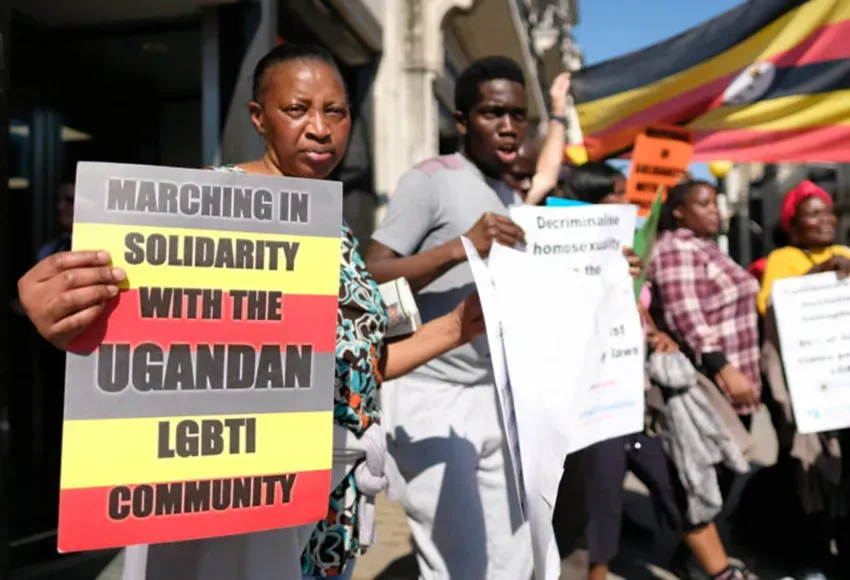World Bank cuts off funding to Uganda in wake of of anti-Queer law
In the wake of anti-Queer legislation signed into law in May, the World Bank has cut off all new funding to Uganda.
The new law provides the death penalty for what it calls "aggravated homosexuality," meaning sex while HIV-positive, sex with a minor, and incest; and life imprisonment for "non-aggravated" homosexuality.
In a statement released August 8, the organization stated, "Uganda's Anti-Homosexuality Act fundamentally contradicts the World Bank Group's values. We believe our vision to eradicate poverty on a livable planet can only succeed if it includes everyone irrespective of race, gender, or sexuality. This law undermines those efforts. Inclusion and nondiscrimination sit at the heart of our work around the world."
As of last year, the World Bank had lent Uganda over $5.4 billion through its International Development Association. According to Reuters, loans already agreed to will continue, but there will be no new IDA financing.
Human rights groups and world leaders alike, including President Joe Biden, have condemned the new law. The Convening for Equality Coalition, an alliance of Queer activists and allies working for equality in Uganda, welcomed the World Bank's action, and encouraged further measures. Clare Byarugaba, a co-convener of the coalition and worker for Chapter Four Uganda, said in a statement, "Other countries considering similarly discriminatory laws should take notice of the World Bank's decision and the negative economic impact on their economies. Open and inclusive societies are better for business and better for economic growth."
Frank Mugisha, an activist with Sexual Minorities Uganda and additional co-convener of the coalition, added, "The only way forward is for Uganda's courts to stand up for the principle of nondiscrimination – already enshrined in our constitution – and rule that the law is unconstitutional as soon as possible."
A similar law passed the Ugandan parliament in 2014, but it did not call for the death penalty for "aggravated" homosexuality. A Ugandan court struck it down, not because of its content but because of irregularities in its passage.
Similar laws are being considered in Ghana and Kenya, while the governments in Tanzania and Ethiopia are clamping down on Queer people.
Queer activists in Ethiopia raise alarm over increasing persecution
Government officials in Ethiopia's capital, Addis Ababa, have introduced a wave of persecution against the African nation's Queer communities, according to the House of Guramayle, a Queer rights organization in Ethiopia.
A press release from the organization says, "On Friday, August 4, the Addis Ababa Tourism Bureau released a statement on its official Facebook page stating that it is working to bring attention to hotels and restaurants that are allegedly providing services to LGBTQIA+ persons. The Addis Ababa Police Commission has encouraged the public to report business establishments that allow 'homosexual activities' – a generalisation that could lead to the incrimination of anyone, regardless of their sexual or gender identity."
Officials in Addis Ababa issued a warning in the Facebook post, saying "If there is any sympathy for those who commit and execute this abominable act that is hated by man and God, [the bureau] will continue to take action." Soon after the post, the department launched a hotline for reporting "illegal activities that deviate from the law and social values."
Sexual activities between members of the same gender are illegal in Ethiopia, though Reuters reports that there are no records of anyone being convicted for such acts recently.
That seems to be changing. The Addis Abada police raided a guest house and several venues under suspicion of being "institutions where homosexual acts are carried out." Troublingly, violent acts by private citizens appear to be increasing, fueled by hate speech in social media content.
The House of Guramayle points to videos and messages on social media sites such as TikTok, Meta, and YouTube that incite violence against Queer people, calling on these platforms to remove content that contributes to oppression and violence against these communities.
Bahiru Shewaye, co-founder of the House of Guramayle, said, "TikTok is being used to incite violence," and though several videos calling for anti-Queer violence have been reported, "we are still waiting for them to take action."
For its part, TikTok spokesman Ben Rathe said that the platform has removed videos and banned accounts for violating its community guidelines.
Earlier this year, the Queer advocacy group GLAAD, in its Social Media Safety Index, said that all social media platforms, including TikTok, do poorly at protecting Queer users from hate speech and discrimination.
The organization cites a similar pattern of persecution cresting through several African nations. "While similar increases in attacks against LGBTQIA+ communities are being reported by human rights organisations in other parts of the African continent, the escalation in Ethiopia is especially concerning due to the country's religious history, current worsening sociopolitical climate, and growing nationalism."
"This was a vulnerable group in the first place," Bahiru said. "But the new scale of these calls for violence, it has grown out of control."


